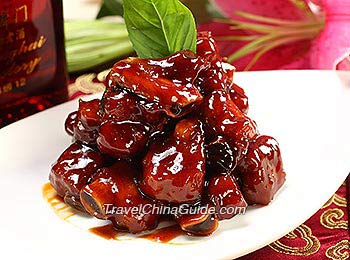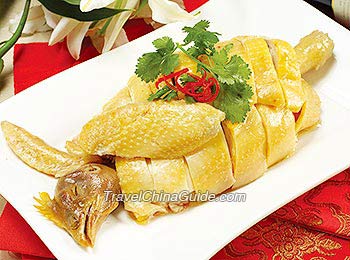Shanghai Food
Shanghai food is not one of the Eight Major Cuisines of China but is a choice blend of the most appealing aspects of these other national styles of food.
Classification
 |
| Typical Shanghainese Food |
Features of Shanghai Food
In recent years, Shanghai food has been greatly influenced by Cantonese Cuisine. Consequently the Shanghainese foods are now less oily and more delicate with the use of more high quality and expensive ingredients. People here have become more concerned about a healthy diet. This means there is an upsurge in the trend towards the use of fresh ingredients and in particular good quality fruit and vegetables.
Top 5 Dishes of Shanghai Food

1. Braised Jumbo Sea Cucumber with Shrimp Roe (Xia Zi Da Wu Shen) is noted as the most famous seafood dish in local cuisine. Dried sea cucumber is immersed in water to restore its original size and then stewed with oil, yellow wine, soybean sauce, broth, sugar, shallot, starch sauce and shrimp roe. This Shanghai dish is nutritious with rich protein and minerals and is said to effectively control cancer.
2. Eight Treasures Chilli Sauce (Ba Bao La Jiang) is typical among the few spicy dishes. As one of the top 5 dishes of Hu Cuisine, it is a Benbang dish featuring great flavor and bright color. Bean sauce and chili sauce are blended and stir-fried with shelled shrimps, chicken, chicken stock, pork, pig offal, dried small shrimps, bamboo shoots and various kinds of seasoning. This dish with such a great number of ingredients gives us some idea of how delicate Hu cuisine can be.
3. Flash Fried River Shrimp (You Bao He Xia) is a good choice if you like sea food. Live shrimps are deep-fried and then sir-fried with a special sauce made of yellow wine, soybean sauce, sugar, shallot sauce and ginger sauce. The dish tastes fairly sweet and fresh.
4. Bamboo Shoot Soup with Fresh and Pickled Streaky Pork (Yan Du Xi'an) is a delicious stew. Pork and ham are first steamed and then stewed in a soup with fresh bamboo shoots.
5. Sautéed Mashed Eel (Qing Chao Shan Hu), also known as Xiang You Shan Hu, is an eel dish. Fresh eels are stir-fried with shredded bamboo shoots, yellow wine, soybean sauce, ginger, sugar and starch sauce. After being put on a plate, chopped shallot is sprinkled on the dish and hot oil is poured onto it. Consequently, Qing Chao Shan Hu crackles when it is served at the table.
Besides the dishes mentioned above, the city also provides diners with an extensive menu of many other delicious dishes such as steamed crabs, sauted shelled shrimps, braised fish, smoked fish, steamed shad, braised herring liver, braised eel, plain boiled chicken and stewed chicken.
In Shanghai food culture, local snacks should not be missed. You should try the famous Nanxiang steamed stuffed buns, crab-yellow pastry, fried stuffed buns, chop rice cake, vegetable stuffed buns, Leisha dumplings and wontons. Various snack streets in the city have many restaurants and eateries to tempt you. Wujiang Road, Old Town God Temple Snack Street, South Yunnan Road and Xianxia Road are the best among them.
As an all-embracing city, Shanghai offers various delicacies from other regions of China and many foreign countries and areas. No matter how fastidious you are about dining, you can enjoy your time to the full!
You can find Shanghai food guide on recipes in the column of TravelChinaGuide.com: Chinese Food Cooking Class
Further Reading: Fu He Hui: The Most Expensive Vegetarian Restaurant in Shanghai
- Last updated on Oct. 30, 2020 -